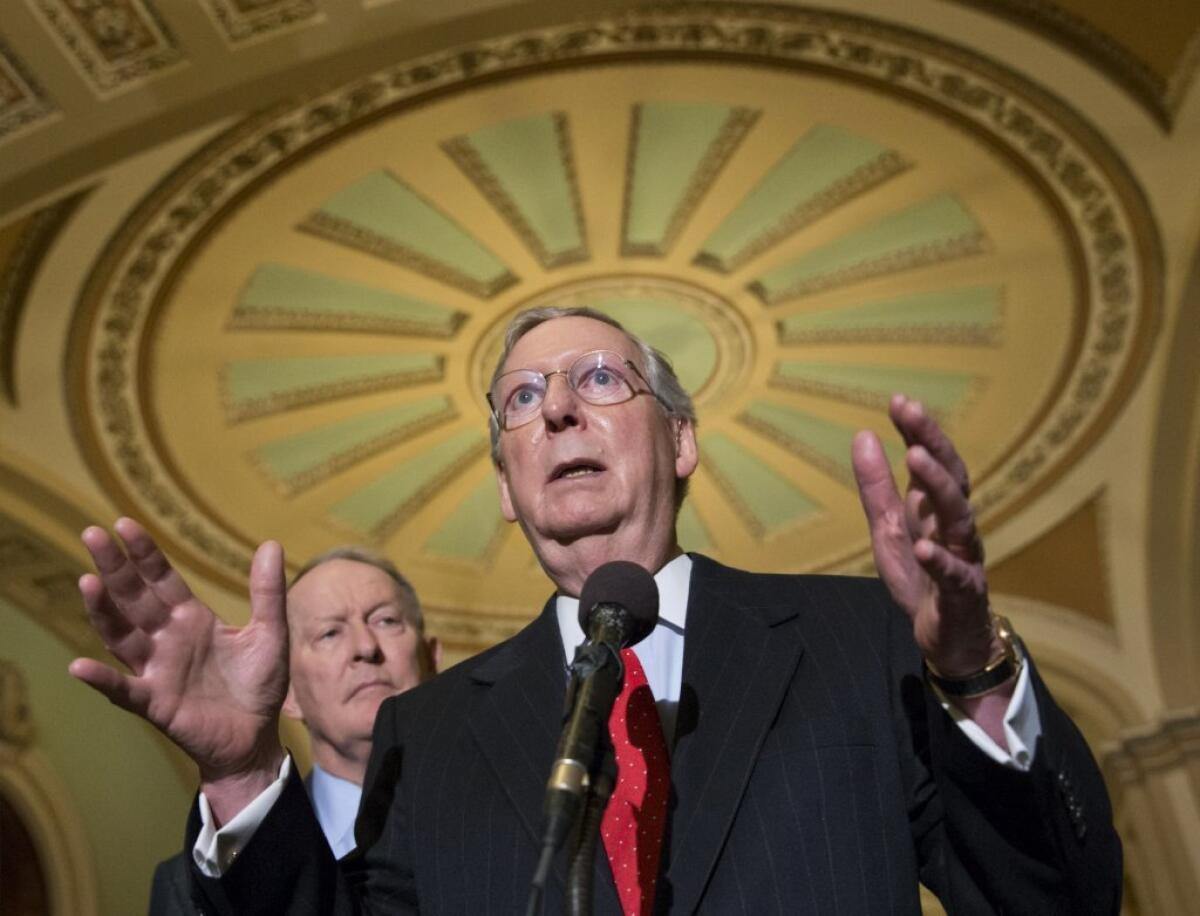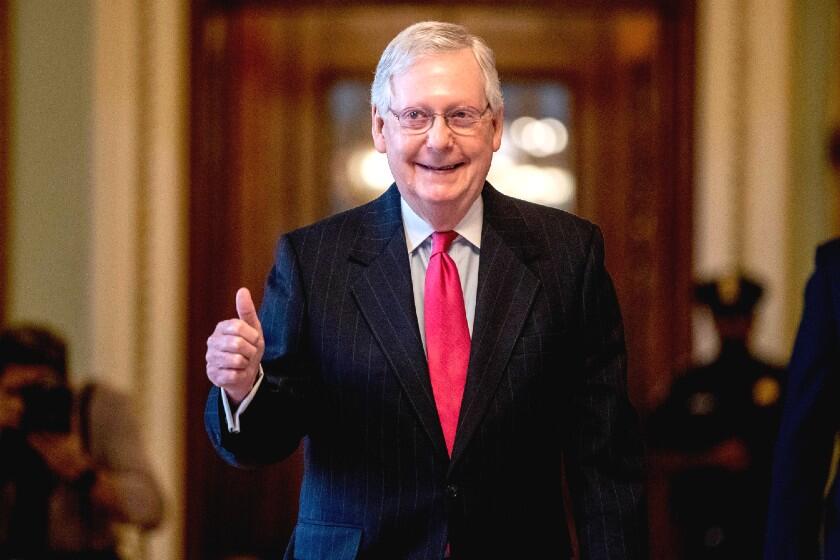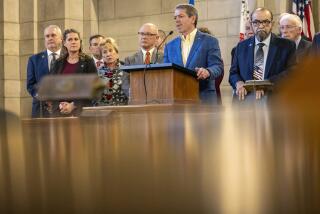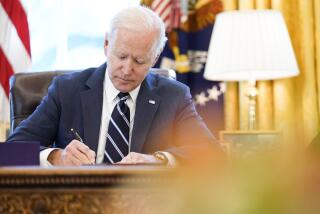Column: As coronavirus devastates state budgets, conservatives target public worker pensions

- Share via
Apparently on the principle that one shouldn’t let a crisis go to waste, conservatives are using the coronavirus crisis to take aim at a favorite target: public employee pensions.
That was the explicit subtext of Senate Majority Leader Mitch McConnell’s broadside against bailing out state and local governments, which he set forth during an interview Wednesday on right-winger Hugh Hewitt’s radio program.
But McConnell is not alone. Conservative commentators Andrew G. Biggs and Eileen Norcross wrote on April 13 that “financial support for key services such as health, welfare, and public safety should not be allowed to morph into a more generalized bailout of state and local pension plans... Any future federal aid packages that might be used to meet pension plan obligations should be conditioned on structural pension reforms.”
I don’t think any public employee, even a great teacher of 30 years, should make more than a colonel in the Army or the Marine Corps who served 25 years, or a captain in the Navy.
— Conservative radio host Hugh Hewitt
These “reforms” included freezing public pension plans for future benefit accruals, and supplanting defined benefit plans, in which employees are insulated from the risk of market downturns, with 401(k)-style defined contribution plans, in which they bear all the risk.
Meanwhile, the libertarian group Illinois Policy called on Congress to reject that state’s $44-billion federal aid request, which includes a $10-billion grant or loan to short up the state’s public pension plans.
The thread connecting this advocacy is not only ideological. The sources are all associated with the Koch brothers network, among other right-wing funding operations.
McConnell has long been a recipient of Koch campaign contributions. The Mercatus Center at Virginia’s George Mason University, which published the piece by Biggs and Norcross, has been heavily supported by the Koch network; Charles Koch is listed as an emeritus member of its board, and its founder and current board member Richard Fink is a longtime Koch aide.
Before the economy recovers, GOP wants to stop giving aid
Illinois Policy is part of a network of Koch-linked think tanks that have targeted public union membership, in part by advancing lawsuits to hamper dues collections.
Now let’s examine the themes tying all this together.
As we reported earlier, McConnell and Hewitt performed a call-and-response routine for the latter’s radio audience in which they suggested that the fiscal pain being felt by states stems largely, if not entirely, from ostensibly overgenerous public employee pensions.
“Some of the benefits they grant are ridiculous,” Hewitt said. “I don’t think any public employee, even a great teacher of 30 years, should make more than a colonel in the Army or the Marine Corps who served 25 years, or a captain in the Navy.”
But it’s fair to ask, “Izzatso?” Hewitt didn’t explain why a teacher shouldn’t retire with as much as a colonel; he just counted on McConnell agreeing supinely.
McConnell obligingly chimed in with the observation, “We’ll certainly insist that anything we’d borrow to send down to the states is not spent on solving problems that they created for themselves over the years with their pension programs.”
He even suggested that it would be better if states could declare bankruptcy (there’s no such provision in the law), even though plainly state bankruptcies would disrupt their operations beyond description.
Biggs and Norcross stated that “the most serious pension funding gaps are largely the result of failures to undertake meaningful pension reforms over the course of the past decade.” That’s a broad statement that requires “meaningful pension reforms” to carry a lot of weight.
Many states’ pension gaps are the result of fiscal strains that prompted them to underfund their annual pension contributions in recent years. Many of those states already have taken steps to correct that trend, but the hangover from previous years persists.
Biggs told me via Twitter that it’s unfair to describe his position as applying to all state requests for federal assistance, only to specific requests for pension help. “It’s clear that we didn’t oppose federal aid to states to Covid-related costs,” he wrote, “but that if a state wants aid for pensions, as Illinois apparently does, that should come with conditions.”
Hollywood’s iconic Musso & Frank Grill fights with its insurer over virus coverage.
It’s true that one could read the Mercatus piece that way, and that Biggs and Norcorss say they would expect states with the most dire pension gaps to seek federal pension bailouts “over the next several years.”
But that caveat seems unduly narrow. (To be fair, Biggs also said I was interpreting the piece “in bad faith.”)
The piece doesn’t state clearly that the “federal assistance” that must be conditioned on pension changes means only assistance specifically and narrowly directed at pensions. It refers to “financial support” that might “morph into a more generalized bailout of state and local pension plans.”
And whatever pension assistance states request in the future, it’s very likely that their financial stringency will have been aggravated by the battle with COVID-19.
Most financial support flowing from the federal government to the states, moreover, might “morph” into assistance for pension financing. Dollars, after all, are fungible: A federal grant covering police or firefighting expenditures, for instance, might give a state more latitude to fund its pensions.
The fiscal potholes faced by states today aren’t predominantly the product of pension shortfalls, but of states and localities stepping up with policies and actions to combat the coronavirus pandemic, while the federal government has sat collectively on its butt. That includes testing and treatment delivered through state healthcare programs.
Many states also have seen their revenue projections plummet. In states like Florida or Nevada, which depend overwhelmingly on sales and use taxes, those sources will be on a flight path to zero as commercial and consumer establishments remain shut down.
That’s why states are in trouble -- because they’re shouldering more cost while collecting much less revenue. The two factors put together mean that many states and localities are going to find it harder to meet their pension funding obligations this year, next year and possibly for years after that.
Biggs’ reference to Illinois is instructive. That’s because it’s the only state that has specifically asked for pension relief thus far. As state Senate President Don Harmon wrote in communicating the state’s request to Sen. Richard Durbin (D-Ill.), Illinois already had taken steps to place its public pensions on an actuarially sound footing. But then the virus arrived.
Here’s what a hospital chain went through to get a supply of coronavirus masks
In a normal year, Harmon observed, the pension contributions now required under state law would crowd out funding for other state services and programs. “Clearly this will not be a normal year and that crowding out effect will be exacerbated by significant revenue losses.”
The state also asked for a $15-billion no-strings-attached block grant, an increase in the federal share of Medicaid expenses, and about $17 billion in other support.
The most telling evidence that conservatives are largely using the coronavirus pandemic to undermine public employee rights comes from history. Destroying public unions has been at the top of the right-wing wish list for four decades.
The campaign has enjoyed notable recent success, notably with the 2018 Janus decision from the U.S. Supreme Court. The decision, written by conservative Justice Samuel Alito, applied to one key aspect of public employee contracts — the so-called agency fee. That’s the fee that public employee unions in 22 states, including California, charged workers who are represented by those unions but don’t wish to be associated with the unions’ political or ideological positions.
The idea was that since all workers benefit from union contract negotiations and enforcement of contract terms, even those objecting to union political positions should pay something. Alito wrote, in effect, that if they pay anything, their free-speech rights are infringed, and therefore the agency fees are themselves unconstitutional.
Calls to “reform” public pensions are related to the same campaign. Typically, they rely on assertions that public employees are enjoying lavish lives at taxpayer expense once they retire. Is this true? As Illinois Policy acknowledged, the average teacher pension in that state is $58,852 a year and for non-teachers it’s about $35,917. (Illinois Policy calls these figures “generous.”)
For teachers who retired after 30 years of service, the pension is $82,222. State employees, by the way, contribute an average of 4%-6% to their pensions.
What about the colonels and captains that Hewitt shed tears over? The rules are complicated, but it seems that a Navy captain or Army colonel with 30 years of service would receive in the neighborhood of $100,000 or so. In other words, there’s no evidence they’re being shortchanged or that their years of service aren’t honored -- as should be the case with our teachers and other civil servants.
The truth is that states are suffering because they’re shouldering the burden of fighting an implacable pandemic, not because they’re paying their retirees something in the mid-five figures. Withholding aid or placing conditions on it under these circumstances is nothing short of despicable.
More to Read
Inside the business of entertainment
The Wide Shot brings you news, analysis and insights on everything from streaming wars to production — and what it all means for the future.
You may occasionally receive promotional content from the Los Angeles Times.












